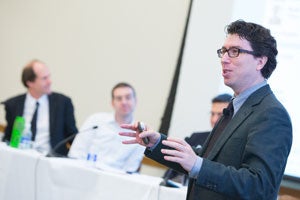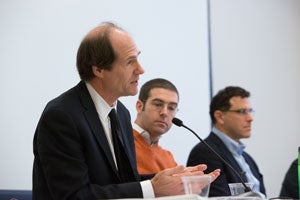Scholars and social media experts convened at Harvard Law School Feb. 6 to examine the ways in which electronic interactive media can sway human decision-making and behavior.
The conference, “Social Media and Behavioral Economics,” was sponsored by Harvard Law School’s new Program on Behavioral Economics and Public Policy and created by the program’s director, Cass Sunstein ’78. Sunstein returned to the HLS faculty last August following three years in the Obama Administration as administrator of the White House Office of Information and Regulatory Affairs in the Office of Management and Budget.
While serving in the OMB, Sunstein was known for trying to make the federal regulatory system “as sensible as possible” by applying cost-benefit analyses and assessments of human behavior to his reviews of proposed governmental rules. It was an approach in keeping with his previous work, such as the 2008 book, “Nudge: Improving Decisions About Health, Wealth, and Happiness,” co-written with behavioral economist Richard H. Thaler, in which Sunstein has advocated that low-cost solutions are often better options than government regulation.
Elliott Schrage, vice president for communications and public policy at Facebook, pointed out how rapidly the influence of social media has come about. He said that when he joined Facebook five years ago, it was seen as “this silly tool where people would poke each other and throw sheep. I distinctly remember being part of conversations where we would say, ‘We think these technologies of connection, not just Facebook, are creating a revolution.’ And people would laugh.”
But after revelations of social media’s role in the creation of the Arab Spring two years ago, he noted, nobody takes social media lightly.
Since then, he said, social media have proven to be successful in a variety of ways, including the improvement of communication between individuals and groups and the achievement of public-health goals.
One of the most dramatic of the public-health initiatives driven by social media has been a Facebook program launched last spring that has prompted 500,000 people to register as organ donors. Sarah Feinberg, Facebook’s director of corporate communications, and Andy Cameron, the surgical director of liver transplantation at John Hopkins University, described the program and the reasons for its success. They pointed out that existing methods for getting people to sign up as organ donors, typically incorporated as opt-ins during visits to Departments of Motor Vehicles, have not been very successful. According to Cameron, 117,000 individuals currently need organs in order to survive and many will die because of a lack of donors.
“If you register to become an organ donor and then share that on Facebook, it creates a news feed that your friends are seeing,” resulting in peer influence for friends to do likewise, Feinberg said
“It’s interesting what happens when you give people the ability to share this information,” she said. “We didn’t preach about it; we didn’t run ads about it.”
“It wasn’t Big Brother asking you for your organs,” Cameron said. “It was your friends. You listen to what they say about movies or music, so you start thinking about this, too.”
Others pointed out how government might take cues from such successes and consider using social media for improving its service to the public.

Mike Luca, an assistant professor at Harvard Business School, reported on his own research involving Yelp.com, a consumer-review website that he said is attracting 84 million unique visitors per quarter and which has begun a program in five cities to allow those municipalities to export restaurant health scores directly into Yelp’s database.
This provides a service to readers and to a business boost to restaurants with good scores, but Luca said it also offers an opportunity for health-inspection offices to utilize the information on Yelp to better guide deployment of health inspectors.
HLS professor Jonathan Zittrain—a faculty co-director of the Berkman Center for Internet and Society—said that there’s evidence now that what people thought was undiluted “peer to peer” social media information is being altered by institutions with an interest in influencing how people think. He pointed to the example of Zappos, the online shoe dealer, which employs the Amazon Mechanical Turk web “crowd-sourcing” engine to fix the grammar and spelling of consumer reviews on its website on the premise that better-written reviews result in greater sales, even if they are negative.
Zittrain said he wasn’t ready to pass judgment on that kind of activity.
However, he added, if institutions are intermediating in ways that cast doubt on veracity, “then I think we absolutely have to think about a framework for how to account for that.”
Questions about governmental response to the rapid ascent of social media were raised repeatedly throughout the conference. As Sunstein noted during one panel discussion, the complicated questions are yet to be answered about the rules that are yet to be developed about privacy protections for individuals on one hand and free information flows on the other.
“Insufficiently considered judgments of the tradeoff between those two might compromise something that democratic societies hold dear,” he said.
